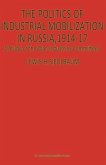It has been said that history is a debate between the present and the past about the future. Nowhere are these lines drawn more significantly than in the study of science and war. And nowhere is the discourse more relevant, than in the study of science and technology as foundations and multipliers of military power. This book is concerned with one particularly seminal aspect of this development - the history of chemical munitions during and immediately after the First World War. The Great War, as it came to be known, was not the first industrial war, but it was the first to involve all the major industrial nations of the world. Within four years, the world witnessed unprecedented feats of industrial development, many of which drew upon and extended pre-war reservoirs of scientific and technological knowledge. The experience comes down to us as a conjuncture of scientific, economic, political and, ultimately, military departures, which by their nature involved new ways of meeting crises, and eventually new forms of critical thinking. That these new forms emerged only gradually and unexpectedly is not to underestimate their capacity to endure, or to minimize their relevance. From the Great War came patterns, assumptions, and practices which were to make an indelible mark on science and technology for the rest of the twentieth century and beyond.
Bitte wählen Sie Ihr Anliegen aus.
Rechnungen
Retourenschein anfordern
Bestellstatus
Storno








